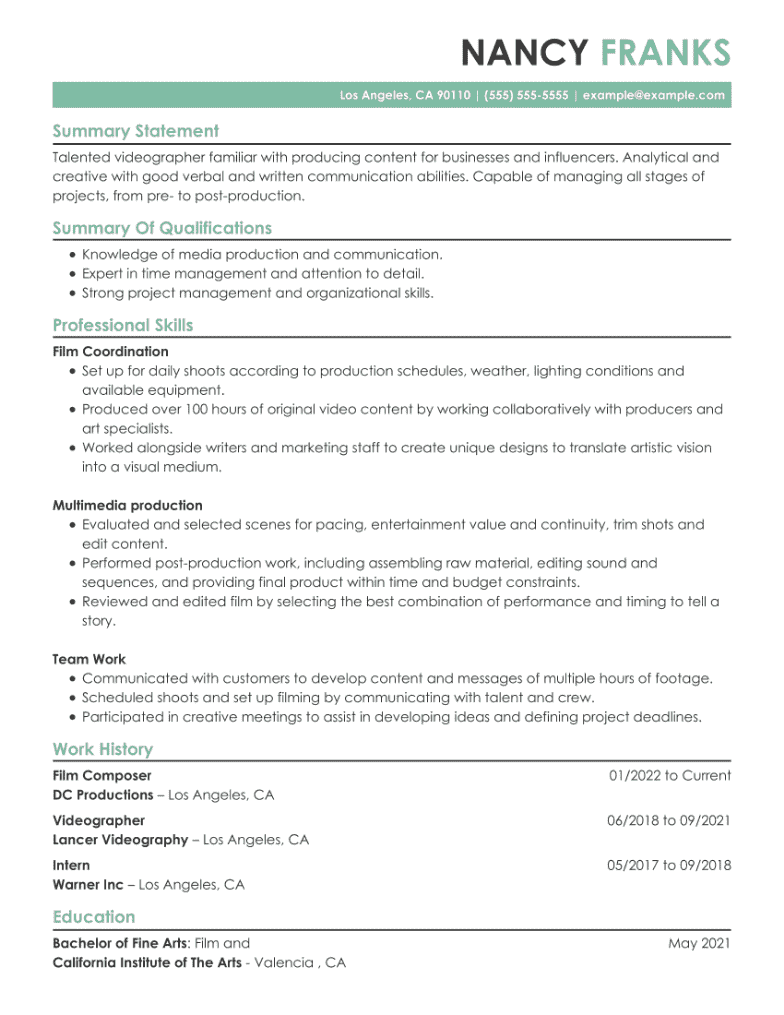Stunning Film Resume Example for This Year
Looking for a job in film production? Use these industry-specific tips and film resume examples to write a resume that earns you a job in the film industry.
We personalize your experience.
We use cookies in our website to ensure we give you the best experience, get to know our users and deliver better marketing. For this purpose, we may share the information collected with third parties. By clicking “Allow cookies” you give us your consent to use all cookies. If you prefer to manage your cookies click on the “Manage cookies” link below.
Looking for a job in film production? Use these industry-specific tips and film resume examples to write a resume that earns you a job in the film industry.

Use the layout, structure and content of this film resume sample as inspiration for your own resume.

Resume writing, just like film production, is all about storytelling. To land a job in the competitive film industry, you’ll have to put on a powerful performance that wins the admiration of your audience – in your professional resume.
Writing a resume is your first chance to make a good impression and show that you can play a leading role in the employer’s future successes. With our tips, examples, and intuitive Resume Builder tool, you’ll be well on your way to stardom in no time.
This guide will show you:
As with the films you work on, there will be many moving parts to your resume. What you choose to include on your resume will vary depending on the role you apply to. A casting director, for example, will need to demonstrate a different set of skills compared to a film director.
Once you’ve pinpointed the role you’re apply to, you can begin to look through the job description and tailor your resume accordingly. Hiring managers will be most interested in your previous work experience and film credits, as these sections give a flavor of where your talents lie.
If you’re applying to a video production, photography, or editing role, then you’ll also have to showcase your technical skills. Proficiency in a range of video editing tools may be an essential requirement in these cases.
The structure of a film resume will vary slightly from the traditional resume format. This is because you should include a ‘film credits’ or ‘selected projects’ section to accompany the traditional resume sections.
You have a choice of three resume formats for your resume:
While we usually recommend the chronological format, depending on your mix of skills and professional experience, you may find a functional or combination format is better for you. The resume sample below uses the combination format.
Insert your contact details in the resume header at the top of the page. This includes:
Present this information clearly so that the recruiter can easily contact you should they wish to progress your application.
The resume summary (or resume objective) is an important part of your film resume. This section serves as a brief overview of the skills and experiences that best qualify you for the role.
A resume summary covers your key qualities and achievements. A resume objective is similar but also states your career aspirations. If you already have several years of experience in film production, then a resume summary will work best.
You may decide to retitle the traditional skills section of your resume as a “qualifications section” when applying to film roles. The qualifications section serves a similar purpose: to showcase your key areas of expertise within film production. Place less emphasis on soft skills here; the hiring manager will want to gauge your competence with role-specific hard skills. These include:
Tailor your resume skills to the role. To do this, read through the job description and include any of the desirable skills that you possess on your resume.
If you have previous industry experience, then add a section that lists some of the projects you’ve worked on. Rather than list all of your film credits, cherry-pick three to five projects that will be of greatest interest to the hiring manager. For each project, include the film name and your job title. Work history Use the work experience section to describe in greater detail your previous roles in film. For each position, list in bullet points the tasks and responsibilities that are most relevant to the role you’re applying to. Exclude any jobs not related to film production.
If you have a relevant master’s or bachelor’s degree in film production or another related field, then you should include this in the education section at the bottom of your resume. List only your highest level of education here. You may also include relevant certifications.
Create your resume
Have questions? We’re here to help.
Unless the employer says not to, always write a cover letter to accompany your resume in an application. The cover letter allows you to explore in greater detail your key skills and experiences. It’s another opportunity to tailor your application to the needs of the role and can also be used to explain any gaps on your resume.
You can still write an effective film resume without much professional experience. Focus on experiences as an intern or volunteer in a film production capacity. Place emphasis on the education and skills sections and show you have the skills to fulfill the job at hand.
Always customize your resume to each new role you apply to. Tailor your professional summary to highlight only the most relevant experience and skills for the role. Follow the same approach with your skills and film credits sections to increase your chances of securing an interview.
Couldn't find the answer you're looking for?